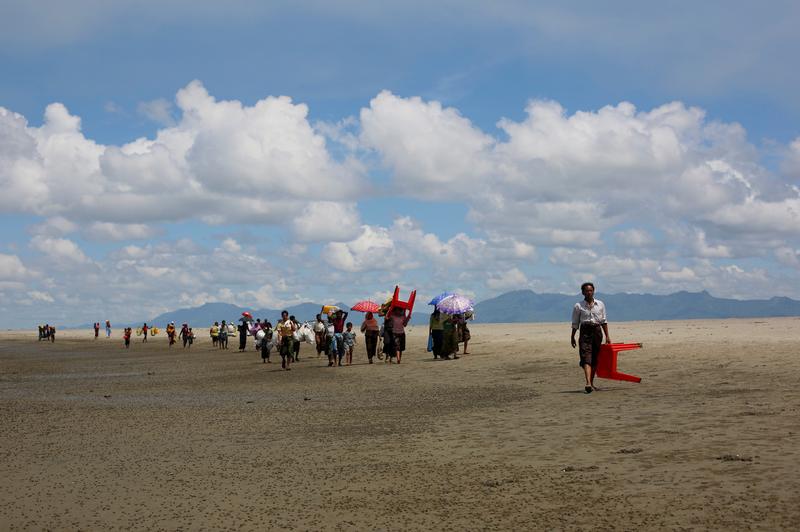Two weeks since the Burmese government pledged to begin a process for the return of hundreds of thousands of Muslim refugees who have fled to Bangladesh, questions about the practicality of a mass repatriation loom large.
In a nationally televised speech on 19 September, State Counsellor Aung San Suu Kyi said the government would welcome back “verified” refugees who fled Burma in the aftermath of the deadly attacks that took place on 25 August in northern Arakan State. The Arakan Rohingya Salvation Army (ARSA) claimed responsibility for the assault on several police outposts, with the subsequent counter-insurgency campaign launched by Burmese security forces leading more than a half million Rohingya Muslims in Arakan State to flee to neighbouring Bangladesh.
The numbers of refugees fleeing Arakan State to Bangladesh has reached about 500,000, according to the UN Office for the Coordination of Humanitarian Affairs (OCHA).
In her speech last month, Suu Kyi stated, “I can confirm now, we are ready to start the verification process at any time and those who have been verified as refugees from this country will be accepted without any problems and with full assurance of their security and their access to humanitarian aid.”
Social Welfare, Relief and Resettlement Minister Dr. Win Myat Aye, chairman of a committee formed to implement the recommendations of the Advisory Commission on Rakhine State, told DVB last week that the state counsellor had instructed him and other members of Suu Kyi’s cabinet to carry out the repatriation process as soon as possible in accordance with a previous agreement between Burma and Bangladesh inked in 1992.
“We have to form a team to start the process,” he said. “Foreign experts and other locals will participate in this team and we [Burma] and Bangladesh need to meet for the process. We have invited the minister of home affairs from Bangladesh to start the process.”
On Monday, talks were held between representatives from the Burmese and Bangladeshi governments in the latter’s capital Dhaka to discuss the repatriation process. Bangladeshi Foreign Minister A.H. Mahmood Ali said the delegation sent by Suu Kyi had agreed to set up a working group to coordinate the repatriation, but no firm timeframe was given for when that process would begin.
“We have a policy for the repatriation process and we will go along with that,” a government spokesperson, Zaw Htay, told Reuters earlier this week.
Political analyst Maung Maung Soe said international criticism of the Burmese government will surely continue as the process is to be implemented in accordance with the 1992 agreement.
The agreement states that refugees can only return if they are carrying “Myanmar citizenship identity cards / national registration cards; those able to present any other documents issued by relevant Myanmar authorities and: all those persons able to furnish evidence of their residence in Myanmar.”
Maung Maung Soe added, “The international community, including the Bangladesh government, will criticise it as they want all refugees to return, so both countries will face challenges.”
Obstacles ahead
Although Suu Kyi made repatriation sound simple enough, migration experts have been quick to point out the flaws in this process.
Most Rohingya lack Burmese citizenship, with legislation on the matter, passed in 1982, leaving approximately 1 million members of the self-identifying Muslim minority without citizenship documents. .
When asked about some of the challenges with the verification process, a spokesperson for the Office of the UN High Commissioner for Refugees (UNHCR) office in Rangoon told DVB, “Proof of residence in Myanmar should be approached in a practical, flexible manner as many stateless Muslims have faced challenges in obtaining government documentation.”
He also pointed to the uncertain situation that lingers in northern Arakan State and urged, “Safety and protection should be provided for the returnees ahead of the voluntary repatriation process.”
Refugees in Bangladesh camps since 1990s
Human Rights Watch’s deputy Asia director, Phil Robertson, points to the tens of thousands of Rohingya refugees who have remained in camps in Bangladesh since 1991 as a warning to not rush repatriation.
“Rohingya have remained in a refugee camp [in] Bangladesh, preferring to eke out a difficult living there rather than return to potential danger to northern Rakhine [Arakan] State, where time and time again the Burmese military has shown is it more interested in preying upon rather than protecting the Rohingya,” said Robertson.
He urged that repatriation assessments should be conducted by the UNHCR, not the governments of Bangladesh or Burma, which have a history of “playing Ping-Pong with Rohingya refugees, pushing them back and forth across the border.”
Kim Jolliffe, an independent conflict and security researcher, welcomed Suu Kyi’s pledge, but stressed that large numbers of the refugee population will likely refuse to go back any time soon, having lost everything and suffering from trauma.
[related]
While refugees make that decision balancing these factors against their need to return to farmland, livelihoods and family, commentators are also worried about the Burmese military’s cooperation.
Jolliffe said he is sceptical that the military will allow the process to run smoothly and warns of further complications based on the experiences of the early 1990s, when “many Rohingya were allegedly forcibly repatriated.”
It’s still unclear what kind of assistance repatriates would receive upon returning to Arakan State and the UNHCR said the agency was unaware of any community organisations that have been engaged in assisting with this process.
With additional reporting by Ye Mon



